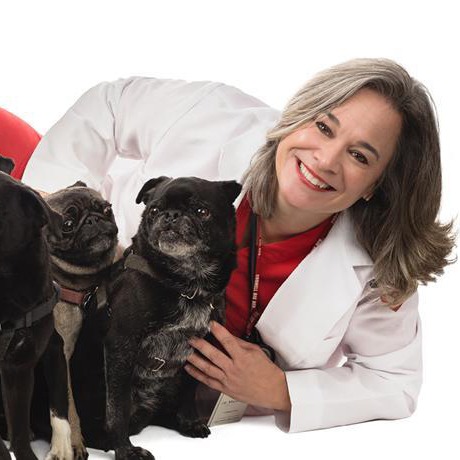Canine Parvovirus – increasing survival. Updates on Vaccinations and Therapeutics
Species
Small Animal
Contact Hours
3 Hours - RACE Approval Pending
Language
English
Discipline
Anaesthesia & Pain Management
Emergency & Critical Care
Internal Medicine – Endocrinology, Haematology, Infectious Diseases, Parasitology & Oncology
Pathology - Clinical & Gross
Toxicology & Pharmacology
Time: London 6PM / Paris 7PM / New York 1PM / Sydney 5:00AM (+1)
Panelists:
Elisa Mazzaferro MS, DVM, PhD, DACVECC - Cornell University, USA
Stefan Unterer Prof., Dr. med. vet., Dr. habil., DECVIM-CA - University of Zurich, Switzerland
Kristin Zersen DVM, MS, DACVECC - Colorado State University, USA
Moderator:
Katrin Hartmann Prof. Dr. med. vet., Dr. habil., DECVIM-CA - LMU Munich, Germany
PANEL DISCUSSION DESCRIPTION
Canine parvoviral enteritis is a highly contagious viral disease of puppies that causes haemorrhagic diarrhoea and is still one of the most common causes of morbidity and mortality in dogs. Whilst in some individuals the symptoms can be mild, in many cases it can be fatal, especially if left untreated / caught too late. It is a significant disease in shelters and lower income areas however it is widespread, especially among unvaccinated animals. Treatment is generally supportive with variable prognosis, and vaccination remains the most effective means of preventing the disease.
One of the challenges with vaccinations is the unknown level and duration of maternal antibodies and the risk of exposure between them wearing off and the vaccinations taking effect. However, the advent of the newest vaccination from MSD breaks through maternal antibodies and may provide protection from 4 weeks old.
There have been advances in treatments too – will the recent USDA provisionally approved canine parvovirus monoclonal antibody treatment be as successful in reducing the burden of supportive care as we hope?
Join us for a stimulating and informative discussion with a multidisciplinary panel of international specialists while they discuss and debate the most effective methods of increasing survival in these patients, as well as the game-changing advancements that have recently been made in the vaccinations and therapeutics available for this disease. Questions from the audience are encouraged.
Katrin Hartmann qualified as a veterinarian from the College of Veterinary Medicine of the LMU (Ludwig-Maximilians-Universitaet) Munich in Germany in 1987. She obtained her Dr. med. vet. in Small Animal Internal Medicine in 1990. From 1988 to 1996, she was Scientific Assistant and Clinical Instructor at the Clinic of Small Animal Medicine of the LMU Munich. She obtained her habilitation (German PhD) in Small Animal Internal Medicine in 1995, and from 1996 to 2001 worked as Assistant Professor (Privatdozentin) at the same clinic. She became Diplomate of the European College of Veterinary Internal Medicine – Companion Animals in 1999 and holds the German title of Fachtieraerztin (specialised veterinarian) in both Internal Medicine and Clinical Pathology. From 2001 to 2003, she worked as Associate Professor of Internal Medicine at the Small Animal Department at the College of Veterinary Medicine, University of Georgia Athens in USA. In 2003, she returned to Munich where she still works today as a Full Professor and Chair of the Clinic of Small Animal Medicine at the LMU Munich. In 2009, she additionally was appointed the First Department Head of the newly founded Centre for Clinical Veterinary Medicine at the LMU Munich and since then acts as either Department Head or Vice Department Head in changing turns.
Her main research interests are in small animal clinical infectiology with a focus on feline virus infections (particularly feline infectious peritonitis and feline retrovirus infections), antiviral chemotherapy, leptospirosis, as well as vaccination and herd immunity.
More InfoDr. Mazzaferro is a graduate of Michigan State University College of Veterinary Medicine, completing an internship at the Veterinary Institute of Trauma in Wisconsin. She completed a residency in Emergency-Critical Care at Colorado State University, where she also earned her PhD. She was board certified by the American College of Veterinary Emergency & Critical Care in 2002. Dr. Mazzaferro is a Staff Criticalist at Cornell University Veterinary Specialists in Stamford, CT, USA and is an adjunct clinical Associate Professor of Emergency and Critical Care at Cornell University College of Veterinary Medicine.
Dr. Mazzaferro is internationally renowned and a leader in her field. She is a past-president of the American College of Veterinary Emergency & Critical Care and is a past-president of the Veterinary Emergency and Critical Care Society. She is also a prolific publisher, having authored four books as well as numerous chapters and manuscripts on a range of topics relating to Emergency and Critical Care Medicine. She lectures extensively nationally and internationally, having given presentations in more than 21 US states and 12 countries. In her spare time, she enjoys gardening, cooking and anything related to pugs. #savetheschmooshies
More InfoStefan Unterer is Professor of Small Animal Internal Medicine and Director of the Small Animal Internal Medicine Clinic at the Vetsuisse Faculty Zurich, Switzerland. He completed his internship and residency in small animal internal medicine at the University of Zürich,Switzerland and University of Georgia,USA. Stefan Unterer became board-certified by the European College of Veterinary Internal Medicine in 2003. After one year in private practice, he returned to academia and became a faculty member at the University of Munich/Germany. He finished his habilitation thesis in 2016. Stefan Unterer is member of the Comparative Gastroenterology Society (CGS), the European Society of Comparative Gastroenterology (ESCG), and the Society of Comparative Hepatology. He supports the Examination Committe of the European College of Veterinary Internal Medicine.
His clinical research projects include the intestinal microbiome, acute hemorrhagic diarrhea in dogs, intestinal barrier function and longterm consequences of acute enteritis.
More InfoDr. Kristin Zersen is an Assistant Professor of Small Animal Emergency and Critical Care and the Head of Service for the Critical Care Unit at the Colorado State University Veterinary Teaching Hospital. She obtained her DVM from UC Davis School of Veterinary Medicine and completed a rotating internship at VCA West Los Angeles Animal Hospital. She completed her residency at Colorado State University. Dr. Zersen is a diplomate of the American College of Veterinary Emergency and Critical Care. Dr. Zersen's professional interests include fluid therapy, infectious disease, and mechanical ventilation. Her research interests include pharmacokinetics and validation of human products in veterinary patients.
Qualified Vet
Online Panel Discussion
USD 110.00
Intern/PhD (Requires proof of status)
Online Panel Discussion
USD 80.00
Vet Nurse/Vet Tech (Requires proof of status)
Online Panel Discussion
USD 80.00
Veterinary Student (Requires proof of status)
Online Panel Discussion
USD 20.00
If the options you are looking for are unavailable, please contact us.
No tax will be added unless you are a UK taxpayer
Choose currency at checkout

 Thu, 30 January, 2025
Thu, 30 January, 2025
 06:00 pm - 09:00 pm
(Your Local Time Zone)
06:00 pm - 09:00 pm
(Your Local Time Zone)

















